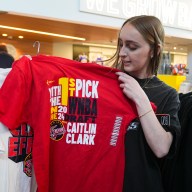When Michelle Dean bought a Pomeranian puppy, she was expecting a happy, healthy dog. Instead, Dean ended up with more than $10,000 in vet bills. Her puppy had a parasitic infection, needed leg surgery and now, at just three years old, is slowly going blind.
The pet store promised Dean that her puppy was healthy and came from a reputable breeder. But as Dean found out, dog buyers should ask plenty of questions before purchasing a pet-store puppy.
Pet stores sometimes give customers assurances by showing them pedigree papers — a sort of family tree for dogs — that suggests the dog is free of genetic defects and has had proper medical checks. But that isn’t always the case. Pedigree papers aren’t the same as a detailed medical check. If a veterinarian had closely examined Dean’s puppy, the leg problems might have been detected and Dean would have known about the problem before buying.
And just because a dog is purebred doesn’t mean it comes from a first-rate breeder.
Dean got the impression from the pet store that her puppy was bred in a home or from a breeder that meets guidelines from the Canadian Veterinary Medical Association. But the CVMA doesn’t endorse breeders, and as Dean found out, her dog certainly didn’t come from a warm and wholesome homestead.
Before being sold in a Canadian pet store, Dean’s puppy came from one of the largest puppy brokers in the U.S. It’s called the Hunte Corporation, a massive Missouri facility that buys and sells roughly 90,000 dogs per year from breeders across the U.S. The company gives the dogs shots, microchips them, and then trucks them out to pet stores across North America.
But the real question is, where was Dean’s dog bred before arriving at the big puppy broker? It came from a puppy breeder in Missouri with USDA violations. The puppies were raised in a shed that looks like a chicken coop. And Dean learned this breeder knowingly sells puppies with back leg problems to some puppy brokers.
None of this is supposed to happen. Fifteen years ago, American and Canadian authorities had promised to crack down on bad breeding. Puppies coming into Canada are apparently checked at the border by veterinarians.
However, no one can tell us exactly how many American dogs come into Canada or end up in our pet stores.
Looking for the perfect puppy?
Read Wendy Mesley’s tips to keep in mind when looking for your new best friend!
– Wendy Mesley is a co-host of CBC News: Marketplace, Canada’s award-winning consumer affairs show, and a regular back-up host with CBC News: The National. CBC News: Marketplace airs each Friday at 8:30 p.m. on CBC Television.
















